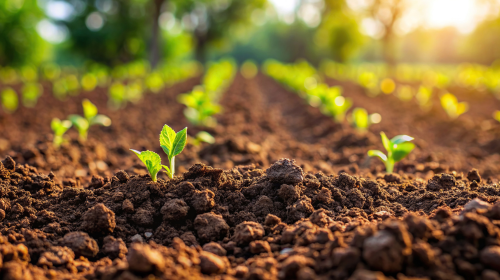
28 June 2024
Registration has opened for farmers in Zone 3 of Northern Ireland’s Soil Nutrient Health Scheme (SNHS). Zone 3 applies to farmers in North Tyrone and County Londonderry who will receive a letter inviting them to apply. The SNHS sees the testing of soils across all farms in Northern Ireland, and participation will be a requirement to receive payment under future farm support schemes. The application deadline is Saturday 31 August.
Analysis by the Energy & Climate Intelligence Unit (ECIU) has found that the price of climate-vulnerable foods continues to rise, despite a falling rate of inflation. The basket of food analysed, which includes potatoes, broccoli and coffee, had increased by over 40% since late-2021. An analyst from ECIU has called for stronger environmental policies, including for rebuilding soil health, to make harvests more resilient and stabilise food prices.
Following the publication of the Department for Agriculture, Food and Rural Affairs’ (Defra) report in February titled Harmonisation of Carbon Accounting Tools for Agriculture, three leading carbon calculators have signed a memorandum of understanding which will see greater harmonisation of methodologies for monitoring on-farm emissions. Defra’s February report found considerable variation in results due to their alignment to different standards and protocols.
Regenerative farming festival Groundswell took place in Hertfordshire this week, with around 8,000 attendees joining for its eighth year. The festival is centred around the principles and practical applications of regenerative farming systems, which includes no-till and cover cropping with the view to improve soil health. Sessions discussed topics including Biodiversity Net Gain, evidencing regenerative and farming support schemes.
At Groundswell, Farm Carbon Toolkit’s Soil Farmer of the Year was announced, with the top prize going to David Newman and Tracy Russell from Buckinghamshire. The competition, which has been running since 2015, recognises farmers who champion their soils and promote soil health to build resilience. This year’s winner will host farm walks and speak at events to share good practice and tips for improving soil health.
The website for the Land Use for Net Zero People and Place (LUNZ) Hub officially launched this week – a consortium of organisations from across the UK which seeks to bridge the gap between science and policy to achieve Net Zero. As part of the website launch, interview discussing some of the critical questions around soil carbon has been posted, which discusses topics including the challenges around measurement and the variability of carbon sequestration potential across different land uses.
Denmark is set to become the first European country to tax emissions from agriculture after a landmark agreement was reached on Monday. From 2030, farmers will have to pay a tax per metric tonne of emitted carbon dioxide as part of the country’s goal to reduce its total emissions by 70% by the same year. Experts believe that the tax will cut 1.8 million tonnes of CO2 emissions during its first year.
China’s Chang’e-6 lunar mission has landed back on earth, returning the first-ever soil samples collected from the far side of the moon, helping scientists understand how planets are formed. Initial analysis has found graphene in the lunar soil, challenging the long-standing belief that the moon was formed from a collision between Earth and another planet.